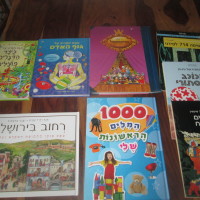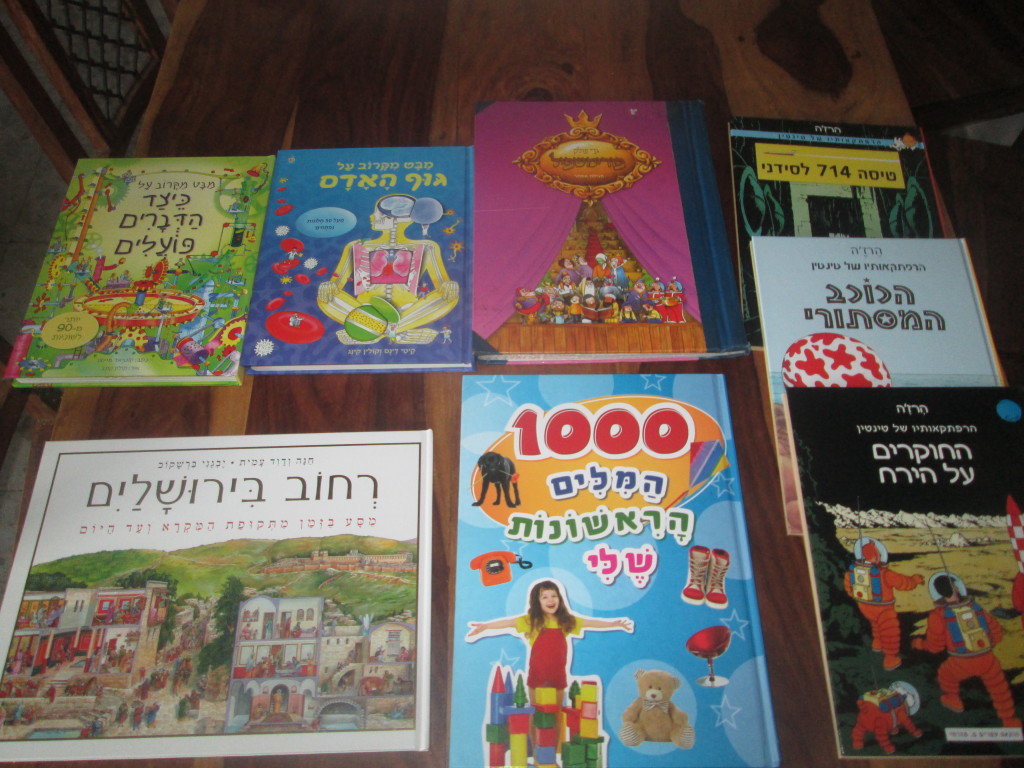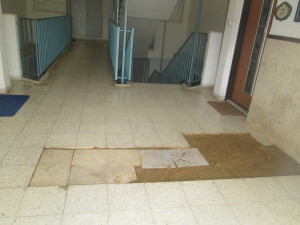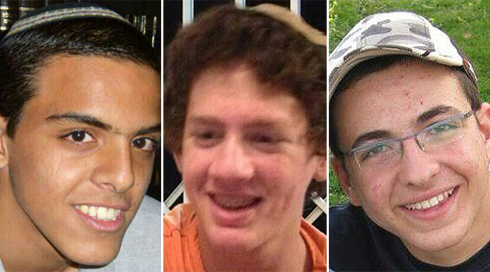>>Can you write a post about your first year of homeschooling in Israel? I’d love to hear how it went!<<
It’s amazing that the school year is officially coming to a close – it’s amazing how fast the time has flown!
How has our first year of homeschooling our kids in Israel been?
Wonderful!!!
That’s not to say that every day is perfect and I always accomplish what I want to, in the spirit that I want to accomplish it. Not at all! But what’s nice about homeschooling is that you don’t need to be perfect, you just need to be adequate and you’ll still have great results. My overall feeling as I reflect on this past school year is one of relief to have reclaimed our family.
I started the year with an almost teenager who was very strongly opposed to being homeschooled – yes, I mean dd13. She had no desire to spend all day with her five younger brothers, and I’m sure you can understand that. I had been torn about homeschooling her since I feel strongly that kids this age should be on board. However, I was convinced that homeschooling would be the best option for her and I overruled her preference as well as my hesitation. That was a fantastic decision.
Dd13 has flowered. There’s no other way to express what has happened this year. She became very closed when she went into school after moving to Israel and her sense of herself just dropped. It was hard to see her, knowing this wasn’t the real her, and despite me telling her teachers that she was reacting to the aliyah, I could tell they didn’t believe me. Well, several of them have seen her this year and every single one has exclaimed with amazement about: her confidence, positive sense of herself, and how happy and at peace she seems. Last week when a former teacher commented about how happy dd looked, she added, “You told us we weren’t seeing her real self, and now I see you were right.”
I’ve many times been told how special my oldest four kids are; just last night someone called to rave about dd17. I tell everyone the truth, I did my part but they each had a big part in turning themselves into amazing people. When dd13 was in school I would look at her and think, she’s not going to be able to access her inner potential if I leave her there and she’s not going to be able to be that amazing person she can be. But now I’m hearing these positive comments about her, too. This was my motivation for homeschooling her in spite of her opposition – to give her the chance she deserved to be her better self.
Dd13 has transformed herself from a resistant learner who had zero academic motivation, to someone who is highly intrinsically motivated. She keeps track of everything she needs to do academically and rarely needs a reminder from me. I recently asked her what else she’d like to learn and she told me she’d like more Torah content, so I’m in the process of increasing that for her. I LOVE when kids take ownership of their learning – push it on them when they aren’t ready and you get resistance; wait for them to develop interest and watch them take off!
Ds11 has also done well. He was under tremendous stress at school and the pressure was taking a big toll on him. He has become much calmer and happier since being home, and is more amiable and easier to get along with. He used to be very resistant to doing anything I asked, but he has become consistently helpful – he does lots of things every day to help out, whereas before if I asked for one thing a day, it entailed lots of complaining. I love being able to see his good heart again.
There were some behavior issues that all improved significantly when we began homeschooling again. Last year I was told by his teacher that he had psychological problems and needed psychiatric medication. This was a decent person though he didn’t have the background nor training to make a statement like that; ignorance doesn’t seem to keep people from saying thoughtless and even dangerous things. It seems like medicating issues is the preferred method in schools of dealing with kids who have some aspect of their behavior that is outside of a limited norm, rather than looking for the core concern and remediating that.
Psychological problems have never been the issue but after homeschooling this year it’s clear to me that I need to do something more to address an underlying need since he remains very emotionally sensitive. A friend who does Brain Gym visited and we spent quite some time in the park watching our kids play. She commented that she sees some signs of infant reflex integration issues in how he moves his body, and said he’s compensating at a very high level. She attributed his compensating so well to the love and support he gets at home.
I’m glad we’ve gotten past the issues at school that have made seeing this possible. As long as he was working so hard to hold it together with the stresses and strains there, we couldn’t have gotten to this point – the point of seeing we have a great kid who needs some targeted intervention. He doesn’t have emotional problems, he doesn’t need therapy – he needs specific help in physically integrating the missing reflexes. Though I’ve done a lot of research on this – it was actually the flip side of some research I did for Yirmi – I’ve decided to turn to someone with many years of experience whose opinion I trust. I’ve just submitted paperwork for an intake appointment with a neurodevelopmental therapist, who will be designing a customized program for him. (To be clear, the comments above were from a friend and I don’t know yet the ND therapist’s thoughts on this; I’m sure that we will get more targeted and specific feedback since she is doing a formal and thorough assessment.) I’m very optimistic about this. If there becomes an issue of not enough time for everything, we have the flexibility to give priority to his program over his academics.
Ds11 made a huge leap with reading this year, going from a hesitant reader to reading all the time in his free time. He made his first siyum on a seder of mishnayos, and is motivated to cover as many mishnayos as possible between now and his bar mitzva (just over a year from now). His Hebrew comprehension is excellent and I can confidently send him to do errands for me, knowing that he can ask for what he needs in Hebrew if something isn’t clear. He’s an extremely smart kid with a fantastic memory.
How have the younger three boys done?
Officially only ds8 is doing formal academics; he completes this pretty quickly and has plenty of time left over for play. I wish people realized how important play is for a child’s development and learning. We tend to think that learning is when they’re filling out workbooks and play is for the time left over, forgetting that for a child, his play is his work and his learning. I’m glad our kids have time to be kids. They grow up so fast…
We’ve enjoyed having a subscription to Discovery Education (I just saw that the current price is amazing, much less than we paid and we paid a heavily discounted price through Homeschool Buyer’s Coop – it’s making me think I should renew for another year at this price!). Edited to add: Discovery Education is available as a free subscription through the end of the summer! We signed up for the free trial last year to see if it would be a good fit for us before we spent any money on it and if you’re interested I suggest you do the same!
Usually twice a week we watch some kind of Discovery educational program, usually based on a topic that the younger three boys ask me to learn more about. Today they asked to learn about beluga whales, so we watched a program about animals in the arctic during the summer time, then followed that with learning about how environmental pollution is affecting these whales. They – along with the older kids – have learned an incredible amount this year and it’s all been so engaging! Ds15 came home for Shabbos about mid year and exclaimed, “They turned into such homeschoolers! How do they know so much?”
Not only do they know so much, what’s much more important to me is that they are kinder and nicer children than when they were in school. This is particularly noticeable with ds6 and all the older kids have commented on how much more pleasant it is to be around the younger kids now. Every single one of them thinks it’s great that their siblings are being homeschooled, and when at times I’ve wondered about if they’d be better off in school as far as learning Hebrew, my older kids are very quick to tell me how positive homeschooling is for them.
So about the Hebrew…my biggest concern, one that was new to me after all these years of homeschooling in the US, was about Hebrew language acquisition. Other than ds8, none of the kids at home were fluent in Hebrew when beginning to homeschool – yes, that’s after 1.5 – 2 years of school for each of them. When I start to worry about this, I have to remind myself to keep it in perspective. Other than having perspective 🙂 I do a couple of informal activities on a regular basis to help them develop their language skills.
I read children’s books with my younger boys in Hebrew daily; I read the Hebrew and then translate into English, sentence by sentence. I can see a notable jump in the comprehension of ds6, who for the most part no longer needs me to translate. He had an issue with fluids in his ears last winter that persisted for a long time that dramatically limited his hearing and I believe this is why he didn’t pick up Hebrew sooner. (We just had his hearing tested this week and thank God, finally his hearing is normal again.) He’s begun speaking Hebrew with friends in the park; he used to stay to himself. I think he wasn’t confident about what was going on because he couldn’t hear well, but now is part of the gang. Daily bike riding, ball playing, board games with friends – it’s very nice to see him take off.
Ds5 (he just had a birthday!) still needs translation but I hear him saying things in Hebrew to friends who come here to play as well as when he goes to the park. I’m not worried, it will come with time. He seems to process auditory things well.
Their English comprehension and vocabulary is excellent. I’d love to find some nice kids’ stories in Hebrew for them to listen to daily. I had wanted to do this at the beginning of the year but didn’t end up following through on a couple of suggestions that were listed here in the comments section. I need to go back and search, but am also open to any new suggestions if you have some!
I also speak to the kids sporadically in Hebrew during the course of each day. The purpose of this isn’t to pretend to be a native Hebrew speaker, which I’m not. It’s to accustom them to hearing Hebrew so they don’t develop a resistance or self-consciousness that comes from lack of exposure. Of course, it also helps them learn common vocabulary and to respond to me in Hebrew without the pressure of making a mistake.
For myself, I feel like I lost sight a bit of the bigger vision of what kind of learning experience homeschooling can be. Yes, they did well academically while being able to have plenty of time for friends and play time. But it can be hard to hold on to the bigger picture during the day to day living and I also had a lot of my mental space taken up for months with our plans to move. So now I’m taking some time to think about my deeper beliefs about homeschooling. I just ordered Natural Born Learners for my Kindle a couple of days ago when it was offered for free and am enjoying reading it. So far I’ve found several essays to be by very well-thought out individuals as to what education is about, how it happens and what prevents meaningful learning. I don’t agree with everything but enjoy challenging myself to think more broadly about learning and to think about how I can integrate some of these ideas in our home.
We plan to continue homeschooling everyone for the coming year. The pressure to put Yirmiyahu in a therapeutic day care hasn’t abated but I have no doubt that our home is the best learning and living environment for him, just as it is for all the other kids at this point. In another year we’ll reassess and see how everyone is doing.
Avivah










![Parent_Teacher_Conference_6238503[1]](http://avivahwerner.com/wp-content/uploads/2014/06/Parent_Teacher_Conference_62385031-200x200.jpg)



